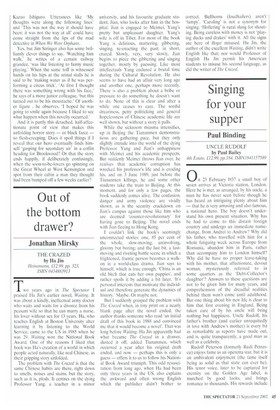Out of the bottom drawer?
Jonathan Mirsky
THE CRAZED by Ha Jin Heinemann, 1:12.99, pp. 323, ISBN 0434883913 Two years ago in The Spectator I praised Ha Jin's earlier novel, Waiting. It was about a kindly, ineffectual army doctor who waits and waits for a divorce from his peasant wife so that he can marry a nurse, his lover without sex for 13 years. Ha, who teaches English at Boston University after learning it by listening to the World Service, came to the US in 1985 when he was 29. Waiting won the National Book Award, One of the reasons I liked that book was Ha's creation of a world in which people acted naturally, like real Chinese, as their gripping story unfolded.
The problem with The Crazed is that the same Chinese habits are there, right down to smells, noises and stains, but the story, such as it is, plods. It centres on the dying Professor Yang, a teacher in a minor university, and his favourite graduate student, Jian, who looks after him in the hospital. Jian is engaged to Meimei, Yang's pretty but unpleasant daughter. Yang's wife is off in Tibet. For most of the book Yang is delirious, muttering, gibbering, singing, re-enacting the past; in short, crazed. Slowly, very, very slowly, Jian begins to piece the gibbering and singing together, mostly by guessing. Like most intellectuals Yang endured a brutal time during the Cultural Revolution. He also seems to have had an affair very long ago and another one, perhaps more recently. There is also a problem about a bribe or pressure to do something he doesn't want to do. None of this is clear and after a while one ceases to care. The sordid dreariness, petty politicking and general hopelessness of Chinese academic life are well shown, but without a story it palls.
While the sickroom miasma intensifies, up in Beijing the Tiananmen demonstrations are gathering pace, but they only slightly intrude into the world of the dying Professor Yang and Jian's unhappiness with Meimei and his academic prospects. But suddenly Meimei throws Jian over, he realises that academic corruption has wrecked his professor's life and is eroding his, and on 3 June 1989, just before the Tiananmen killings, he and some other students take the train to Beijing. At this moment, and for only a few pages, the book suddenly comes alive. The confusion, danger and army violence are vividly shown, as is the security crackdown on Jian's campus against those like him who are deemed 'counter-revolutionary' for having gone to Beijing. The novel ends with Jian fleeing to Hong Kong.
I couldn't link the book's seemingly unconnected stories: one, 85 per cent of the whole, slow-moving, uninvolving, gloomy but boring; and the last bit, a fastmoving and riveting battle scene in which a frightened, frantic person becomes a walkon in a world-class drama. Jian says to himself, which is true enough, 'China is an old bitch that eats her own puppies', and rather spoils it by adding a bit later, 'It's personal interests that motivate the individual and therefore generate the dynamics of history.' Maybe. Or maybe not.
But I suddenly grasped the problem with The Crazed when, in tiny print on a nearly blank page after the novel ended, the author thanks someone who read an initial draft of this book in 1988 and convinced me that it would become a novel'. That was long before Waiting. Ha Jin apparently had what became The Crazed in a drawer, dusted it off, added Tiananmen, which occurred a year after his original draft ended, and now — perhaps this is only a guess — offers it to us to follow his National Book Award triumph. This odd resuscitation from long ago, when Ha had been only three years in the US, also explains the awkward and often wrong English which the publisher didn't bother to
correct. Bullhorns (loudhailers) aren't 'lumpy'. 'Caroling' is not a synonym for singing. 'Hollering' is rural slang for shouting. Being careless with money is not 'playing ducks and drakes' with it. All the signs are here of Roget misused. Ha Jin, the author of the excellent Waiting, didn't write English like that; nor would Professor of English Ha Jin permit his American students to misuse his second language, as did the writer of The Crazed.










































































 Previous page
Previous page